Maduro isn’t Chavez
One thing is clear: Maduro lacks Chavez's political skills.
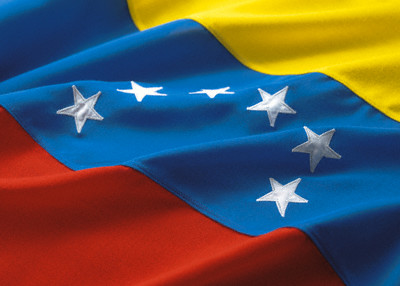 Via the BBC: Venezuela leader Nicolas Maduro seeks talks with Obama
Via the BBC: Venezuela leader Nicolas Maduro seeks talks with Obama
Venezuelan leader Nicolas Maduro has invited US President Barack Obama to join him in talks aimed at resolving the problems between the two countries.
Mr Maduro said the meeting would help “put the truth out on the table”.
He has accused US conservatives and media organisations of plotting to overthrow his government.
[…]
In a news conference on Friday, Mr Maduro said: “I call for a dialogue between Venezuela and the United States and its government.
“Let’s initiate a high-level dialogue and let’s put the truth out on the table.”
The dialogue will be “difficult and complex”, Mr Maduro said, until the American government accepted “the full autonomy and independence of Latin America”.
On Sunday Venezuela expelled three US diplomats accused of meeting violent groups linked to the opposition.
Now, the accusation that the US is trying to stir the coup pot is nothing new. Indeed, back in 2002 the US was far too quick to back a nascent (and ultimately failed) coup attempt against Hugo Chavez. Much (although by no means all) of the acrimony that existed between the Bush and Chavez administrations was linked to those events.
Further, much of the rhetoric of chavismo has been anti-US (often stated as against “the empire”). As such, Maduro’s attempt to link the current unrest to the US is no surprise. However, this call for talks strikes me as an odd play. Rather than trying to use anti-US sentiment to his advantage on the streets, he is calling for talks with the US President? This move illustrates, I would argue, the difference in political skills between Maduro and his predecessor. First, I am not sure how asking for talks with Obama is going to work to Maduro’s benefit. How is a “difficult and complex” dialog going to be a useful remedy to the very immediate drama on the streets of Caracas? Second, it makes it sound as if the solution to the problems of Venezuela are to be found by negotiating with the Yankees. As such, Maduro is saying that he, himself does not have the answers, which is a problematic stance for a leader in this context. Third, obviously such talks are not going to happen, but so what? Will the failure of talks to occur help Maduro’s administration in some way? This seems unlikely. Fourth, there are better ways to blame the US for the situation than this.
In short, the political calculation is unclear and it underscores that Nicolas Maduro is no Hugo Chavez.
Also, there is the blaming the media route:
He has accused US conservatives and media organisations of plotting to overthrow his government.
[…]
Earlier Venezuela had revoked the accreditation of CNN’s Caracas-based reporter, Osmary Hernandez, and those of two other CNN journalists sent to Venezuela to cover a wave of opposition marches.
To which Secretary Kerry rightly observed: “This is not how democracies behave.”

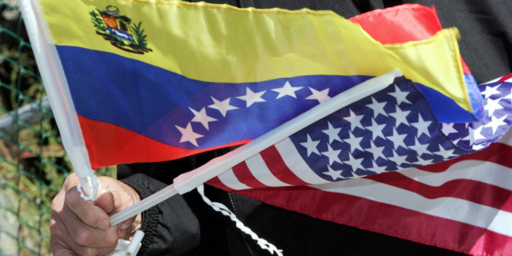
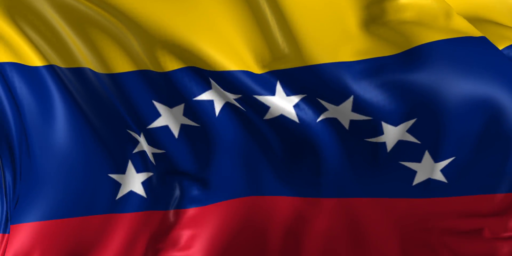
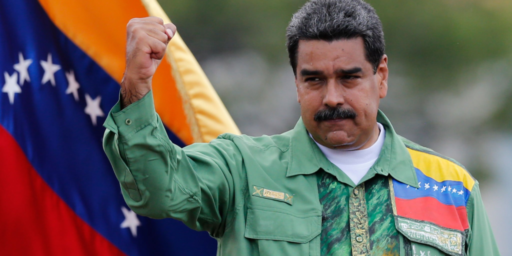
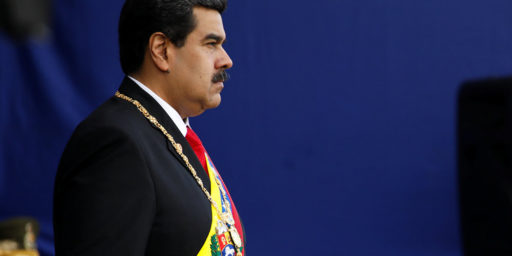
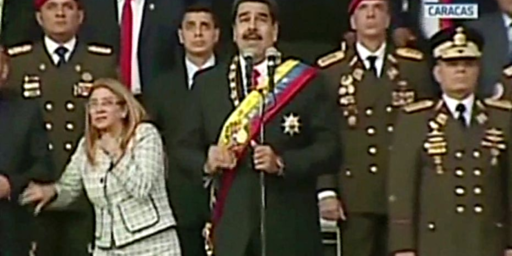
Maduro is a brutal authoritarian who has accelerated Venezuela’s economic decline into massive shortages and inflation, and its descent into violence and crime, despite the fact that Venezuela should be incredibly prosperous due to the massive rise in oil prices over the last dozen years (which resulted in a massive financial windfall for oil-rich Venezuela that propped up the Chavez regime and concealed its economic incompetence and mismanagement).
I am not sure quite what you are driving at when you write:
“Nicolas Maduro is no Hugo Chavez.”
Chavez, too, was brutal, corrupt, and authoritarian. Under his rule, the Venezuelan capital, Caracas, became one of the world’s most violent and crime-prone cities, with a skyrocketing murder rate.
It’s curious to see recommended diarists at liberal blogs like Daily Kos defending Chavez and Maduro, and claiming that student protesters against the brutal regime are just U.S. puppets:
http://libertyunyielding.com/2014/02/22/leading-liberal-web-site-claims-protesters-violent-socialist-regime-u-s-puppets-2/
Are people on the Left really that ideologically blind?
Before Hugo Chavez took over, life expectancy was longer in Venezuela than in neighboring Colombia. Now, it’s shorter, according to the World Almanac, and infant mortality is higher in Venezuela than in neighboring, pro-free-market Colombia.
@Hans Bader:
I mean, quite simply, that Maduro lacks Chavez’s political skills. That is not an endorsement, just an observation. Would you disagree?
I think you are projecting onto what I wrote, btw.
(Indeed, in re-reading your comments and glancing back at my post, I am pretty sure you are just reacting to the headline).
If we accept, it’s an acknowledging we’re behind the protests. If we refuse, it’s proof we bear ill will toward his government.
It’s basically a “so, have you stopped beating your wife yet?” ploy.
@Stormy Dragon: It has that quality, yes, but not in a way that I think is all that helpful to Maduro.
What is a bit worrying to me is that we have seen several examples of oppositions that are able to put huge crowds into the street but which may be not be in the majority and which can’t win elections and form government.
Maduro, whatever his faults, isn’t a dictator or an autocrat. He was democratically elected, and if an early election was called, might win again.
I think we have to be careful now of the idea that just because the opposition can put huge numbers of people into the street, that it necessarily reflects “The will of the people” or is likely to lead to a democratic result. (Exhibit A: Egypt, where a “mass uprising” opened the door to a military coup, the overthrow of a democratically elected government, and the return to military rule).
I would be very cautious in getting involved in the Venezuela situation at all. If I was Obama , I would stand pat and just issue a general statement that the Venezuelan people should work this out, without any foreign interference.
@stonetools:
Indeed. I seriously doubt we will see anything from the Obama administration but that very response. There is nothing to be gained through involvement.
There is something insightful in Ross Douthat’s column in today’s NYTimes (words I never expected to write) using the events in Ukraine to demonstrate that a ‘new cold war’ is impossible. He says that the Francis Fukuyama’s ‘end of history’ concept of a complete victory for the present somewhat-liberal and mostly-capitalist system has made the outliers (NKorea, Pres Putin, Maduro) much less secure than they would once have been. For the enemies of our present world system, any defeat can be fatal, he says. It looks like Pres Maduro has looked his situation over and agreed.
The U.S. openly funds the Venezuelan opposition and is virtually alone in refusing to recognize Maduro’s government. For Kerry to lecture about proper behavior among democracies is rank hypocrisy, given his own has spent the last hundred years overthrowing dozens of democratically elected governments it found insufficiently subservient.
I don’t know whether Maduro is a good president, because he hasn’t had the opportunity to do much else than react to foreign meddling. I do know the fall of his government will mean the beginning of corporate imperialism and national asset-stripping for Venezuela.
@Hans Bader: Under twelve years of Chavez the infant mortality rate fell from 20 per 1,000 births to 13. Extreme poverty fell by two-thirds and unemployment by half. And it’s absurd to attack the man as unusually brutal; you can’t name one U.S. president in the last sixty years who hasn’t been responsible for more deaths and suffering than occurred during Chavez’s tenure.
@Ben Wolf:
Your figures are contradicted by the World Almanac. The U.S. has not sought to overthrow Maduro, or recognized anyone else as the government of Venezuela.
To the extent that poverty fell at all, it is because oil prices, which were at a low when Chavez took over, rose stratospherically after he took office, resulting in a huge oil windfall for his government and country that would have reduced poverty in the country even more under a more pro-free-market government.
Poverty has fallen massively in neighboring capitalist Colombia over the last dozen years, even though Colombia, unlike Venezuela, does not have huge amounts of oil.